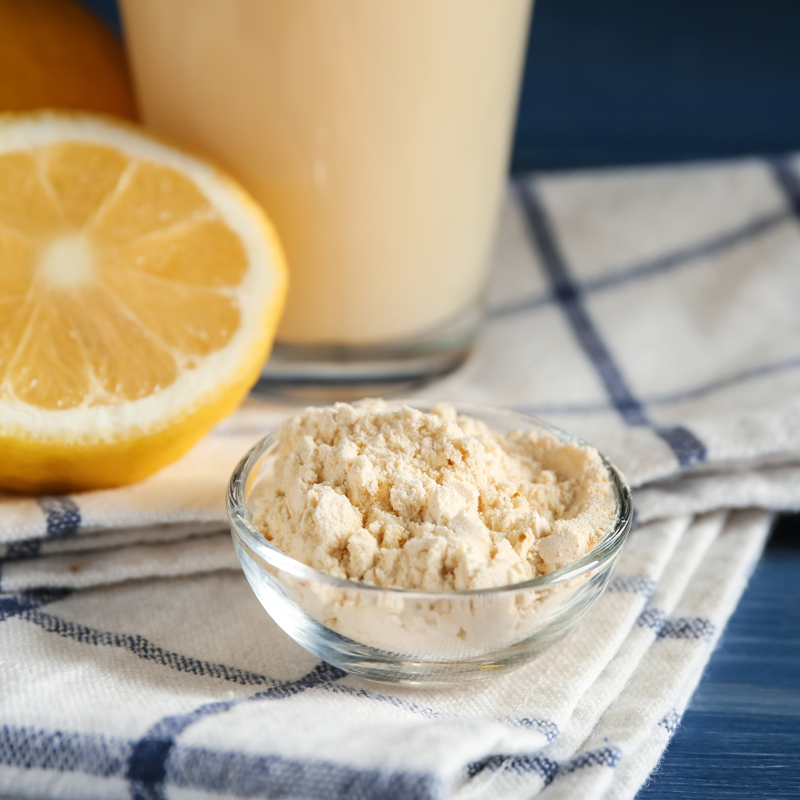
7 Common Ingredients in Vegan Protein Powders that Can Cause Bloating
Protein powder has become a popular supplement for people of all diets, not just those focused on fitness goals. It's a convenient way to add protein to your diet, and can be especially beneficial for those following a vegan lifestyle. However, some individuals may experience uncomfortable side effects after consuming vegan protein powders, including bloating, gas, and stomach discomfort. While there are several possible causes for these symptoms, certain ingredients in vegan protein powders have been identified as common culprits. Keep reading to learn more.
1. Soy protein
Soy protein is a popular plant-based protein source that is often used in vegan protein powders. While soy protein is a complete protein and can provide numerous health benefits, it may also cause bloating and gas in some people. This is because soy contains compounds called oligosaccharides, which are not fully digested by the body and can ferment in the gut, leading to gas and bloating. Additionally, some people may be sensitive to soy or have an allergy to soy, which can also cause digestive symptoms.(1)
2. Thickeners
Many protein powders contain thickeners such as xanthan gum, guar gum, or carrageenan. These thickeners are added to protein powders to improve their texture, mixability, and shelf life. While thickeners are generally safe to consume in small amounts, consuming large amounts of thickeners can cause digestive symptoms such as bloating, gas, and diarrhea. Additionally, some people may be sensitive to certain thickeners and experience digestive symptoms even in small amounts.(2)
3. Maltodextrin
Maltodextrin is a carbohydrate derived from corn, rice, or potato starch. It’s often used as a filler or sweetener in vegan protein powders and other processed foods. While maltodextrin is generally safe to consume in small amounts, consuming large amounts of maltodextrin can cause digestive symptoms such as bloating and gas. This is because maltodextrin is a complex carbohydrate that is not fully digested by the body, and can ferment in the gut, leading to gas and bloating. (3)
4. Inulin
Inulin is a type of fiber that is commonly added to vegan protein powders as a prebiotic. While inulin can have beneficial effects on gut health, it can also cause bloating and gas in some people. This is because inulin is a type of fermentable fiber that is not fully digested by the body and can ferment in the gut, leading to gas and bloating. To avoid bloating, it's recommended to consume no more than 10 grams of inulin per day.(4)
5. Artificial flavors and colors
Many vegan protein powders contain artificial flavors and colors to enhance their taste and appearance. While these additives are generally safe to consume in small amounts, consuming large amounts of artificial flavors and colors can cause digestive symptoms such as bloating, gas, and diarrhea. Additionally, some people may be sensitive to certain artificial flavors or colors and experience digestive symptoms even in small amounts.(5)
6. Artificial sweeteners
Many protein powders contain artificial sweeteners such as sucralose, aspartame, and acesulfame potassium. While these sweeteners are low in calories and can make protein powders taste better, they may also cause bloating and other digestive issues. This is because artificial sweeteners are not fully absorbed by the body and can ferment in the gut, leading to gas and bloating. Additionally, some people may be sensitive to certain artificial sweeteners and experience digestive symptoms even in small amounts.(6)
7. Gluten
Gluten is a protein found in wheat, barley, and rye. While gluten is not typically added to protein powders, it can be present as a result of cross-contamination during processing and packaging. For people with gluten sensitivities or celiac disease, consuming even trace amounts of gluten in protein powder can cause digestive symptoms such as bloating, gas, abdominal pain, and diarrhea.(7)
While vegan protein powders can provide numerous health benefits, certain ingredients in them can cause bloating and other digestive symptoms in some people. It’s important to check the ingredient label of vegan protein powders and be aware of any ingredients that may cause digestive issues for you. By choosing an additive-free vegan protein powder, like our Organic Plant Protein + Prebiotics, that's made without these hard-on-your-gut ingredients, you can enjoy the benefits of protein supplementation without the unpleasant side effects.
Sources:
(1) Soy protein and digestive health. (n.d.). Retrieved from https://www.soyfoods.org/nutrition-health/soy-protein-and-digestive-health
(2) Guar gum and digestion: A review. (2012). Journal of Functional Foods, 4(1), 1-8. doi:10.1016/j.jff.2011.08.008
(3) Hargrove, J. L., Greenspan, P., & Hartle, D. K. (2016). Nutritional significance and metabolism of fructose, glucose, and sucrose in humans and animals. Comprehensive Reviews in Food Science and Food Safety, 15(4), 666-683. doi:10.1111/1541-4337.12206
(4) Inulin. (n.d.). Retrieved from https://www.healthline.com/nutrition/inulin
(5) Artificial colors and flavors. (n.d.). Retrieved from https://www.fda.gov/food/food-additives-petitions/artificial-colors-and-flavors
(6) Artificial sweeteners and other sugar substitutes. (n.d.). Retrieved from https://www.mayoclinic.org/healthy-lifestyle/nutrition-and-healthy-eating/in-depth/artificial-sweeteners/art-20046936
(7) Gluten-free diet. (n.d.). Retrieved from https://www.mayoclinic.org/healthy-lifestyle/nutrition-and-healthy-eating/in-depth/gluten-free-diet/art-20048530





